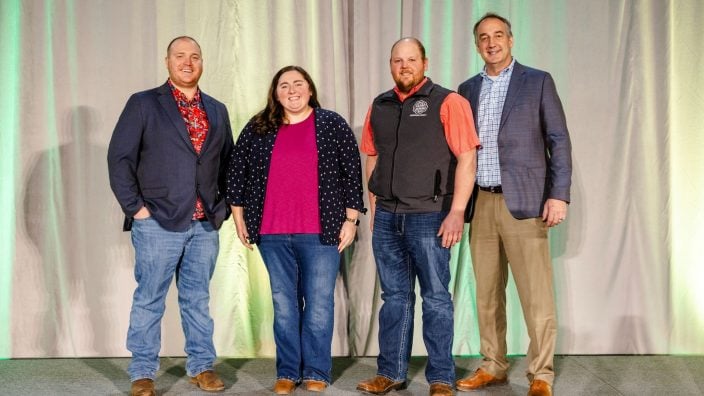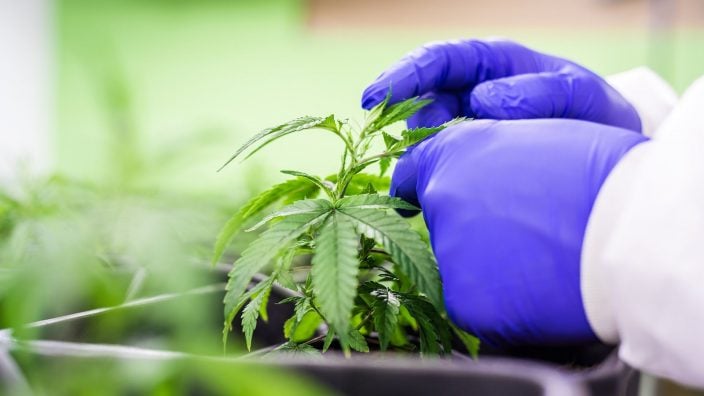Applications for Ohio Farm Bureau Health Plans now available
Members have three ways to apply: contacting a certified agent, calling 833-468-4280 or visiting ohiofarmbureauhealthplans.org.
Read MoreHow will passage of Issue 2 impact agribusinesses and farm employers?
In November, Ohio voters passed Issue 2 by a count of 57% to 43%, which means certain aspects of the legalization of recreational use and cultivation of marijuana will soon go into effect. How will this impact agribusinesses and farm employers? Ohio Farm Bureau’s Policy Counsel Leah Curtis has some answers.
Listen to Legal with Leah, a podcast featuring Ohio Farm Bureau’s Policy Counsel Leah Curtis discussing topics impacting farmers and landowners.
Ty Higgins [00:00:00] In November, Ohio voters passed Issue 2 by a count of 57 to 43, which means certain aspects of the legalization of recreational use and cultivation of marijuana will soon go into effect. What does that mean for agriculture and particularly agribusinesses and farm businesses? Leah Curtis joins us. She’s policy counsel with Ohio Farm Bureau.
Ty Higgins [00:00:28] So let’s talk about this Issue 2. We’ve heard a lot about it. But for those who don’t really know what it did when we passed it back in November here in Ohio, what does it mean?
Leah Curtis [00:00:38] So Issue 2 is essentially a legalization of recreational marijuana and cannabis. The supporters of the issue called it the ‘Regulate marijuana like alcohol initiative.’ So it does allow for legal sale of marijuana and cannabis products, distribution growth, all of those things. Essentially, it creates a framework for the government to create a regulatory structure around that marijuana industry in the coming year.
Ty Higgins [00:01:10] So what segment of our membership will be impacted the most by something like this?
Leah Curtis [00:01:15] So I think the members that we particularly want to make sure they are aware of this are our agribusiness members and really anybody who’s employing anyone, because there are some things that they probably want to think about. We have gotten a lot of questions from employers about how does this change my workplace or my workplace policies. Lots of concerns about safety. So certainly there’s agribusiness. And then just generally, employers really should be kind of paying attention to what’s going on with this situation.
Ty Higgins [00:01:48] What are we telling them? It is very important, especially the safety aspect, and making sure that your policies that you’ve had all these years remain in place. There are things at the federal level that kind of help our employers in agriculture kind of navigate those those issues.
Leah Curtis [00:02:02] So the issue itself that was passed by the voters was very explicit that both public and private employers are still able to develop all their own policies related to marijuana. So that includes drug testing, use while on the job, all of those things. So that was explicit in that issue. That’s going to continue essentially like it always has. You have always as an employer, you are going to make your own policies likely and you can keep doing that. In addition, there are those rights to have a drug testing policy, a drug free workplace policy, a zero tolerance drug policy, all of those things, the right to take employment actions against those people who may be using or distributing or possessing marijuana, either discharging them, disciplining them, etc. And then you don’t have to actually accommodate anybody’s use or possession or distribution as well. So all of those things are pretty clear in the issue that was passed. And then in addition, a lot of people have based their drug policies for their employment on federal laws. So your policies may say ‘No use of illegal drugs’ and maybe it even says ‘Illegal federal drugs are under the Federal Controlled Substances Act.’ Marijuana remains illegal under federal law. And so that is still going to be in place as well.
Ty Higgins [00:03:26] These new laws didn’t go into effect immediately after Election Day. There are some things that need to happen. Give us kind of an idea of a timeline and are there possible changes that could happen to what was passed by the voters?
Leah Curtis [00:03:40] Yes. So when we passed and initiated statute like was done here in November, it goes into effect 30 days after it is passed by the voters. So our timeline then is Dec. 7 for this going into effect. Now, keep in mind that that issue that we passed said that once it was in effect, the Department of Commerce had nine months to create the regulatory structures around licensing and certification for distributors, for sellers, for all those things. So essentially, even under the bare bones language of the issue, it was going to take at least nine months before those regulations would be in place. As you mentioned, there are a lot of discussions at the Statehouse about changes to this law. This was an initiated statute, so the legislature can make changes. And so that may change the timeline as well. There is a lot of talk at the Statehouse, even this week, about the changes that they would like to make. There’s been some language introduced regarding that. And so we may see that happen and that may push the timeline out even further than that nine months that was in the original language passed by the voters.
Ty Higgins [00:04:45] Anything else we’re not thinking about here that employers need to think about?
Leah Curtis [00:04:49] So the last thing I would say is, if you are an employer, this is a great time to take a look at your drug policies for your workplace. Make sure they’re up to date, make sure they say what you intend for them to say. Make sure they maybe are explicit as to federal, illegal and state illegal drugs or whatever you want it to say. Just take this time that we have now until this law really kind of gets moving to review those policies and have them in place the way you want them to be.
Ty Higgins [00:05:15] We have new resources online at ohiofarmbureau.org. You can find out all you need to know about what’s happening here with Issue 2 and what could be happening down the line for the state of Ohio as far as the legalization of recreational use and cultivation of marijuana here in the Buckeye State.


Members have three ways to apply: contacting a certified agent, calling 833-468-4280 or visiting ohiofarmbureauhealthplans.org.
Read More

Legacy nutrient deductions enable new farmland owners to claim deductions on the nutrients within the soil on which healthy crops depend.
Read More

Farmers, agribusinesses and community members are encouraged to nominate their local fire departments for Nationwide’s Nominate Your Fire Department Contest through April 30.
Read More

Introduced by Sen. Paula Hicks-Hudson, SB 120 would establish the Urban Farmer Youth Initiative Pilot Program.
Read More

Gases, vapors, and fumes can all create risk. How can we measure and protect ourselves from them?
Read More

The Ohio Farm Bureau’s Young Agricultural Professionals State Committee has named its 2026 leadership and the individuals who will be serving on the state committee for 2026-2028.
Read More

The Ohio Farm Bureau Foundation has multiple scholarships available to Ohio students from rural, suburban and urban communities who are pursuing degrees with a connection to the agricultural industry.
Read More

With 100% bonus depreciation now permanent, farmers can deduct the full cost of a new agricultural building in the year it’s placed in service.
Read More

Lincoln Deitrick was named the Outstanding Young Farmer, Denver Davis won the Excellence in Agriculture Award, and Margaret Houts won the Discussion Meet.
Read More

Michelle Downing of Franklin County has been named finance director of county operations for Ohio Farm Bureau.
Read More